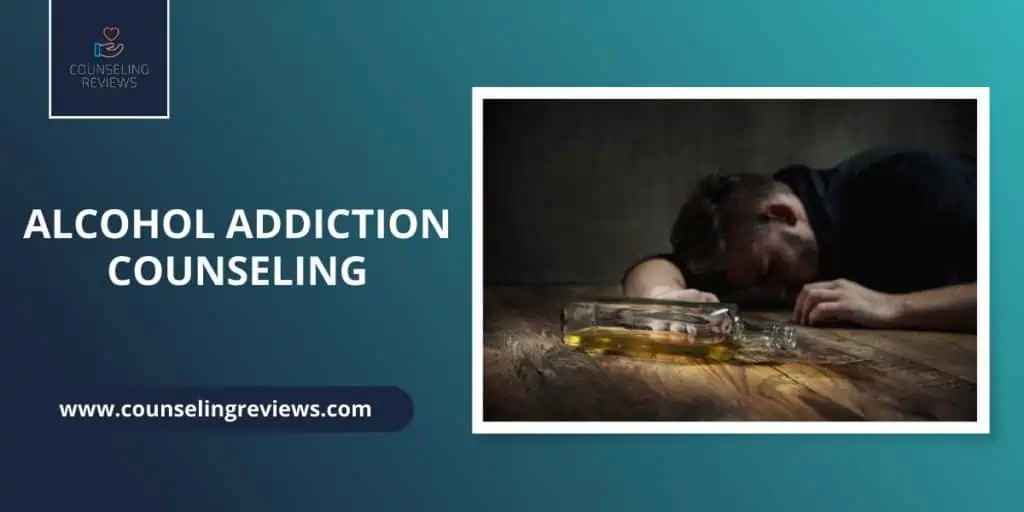The motive of Alcohol addiction counseling is to tackle the underlying causes of Alcoholism. Many health professionals classify addiction as a “disease of the brain” and consider alcohol counseling an essential addiction recovery element. Most often, the sessions are conducted by a top addiction medicine counselor. Support and guidance are given to achieve and then sustain your recovery.
There were only two places to get help for alcohol-related problems, such as Alcoholic Anonymous (AA) and Residential Rehab. But today, there is more than that.
This post is for all people who are looking for options to address drug abuse and alcohol problems for healthier life. The intention is to help you understand what treatment choices are available and what to consider when selecting among them.

Options to treat Alcoholism
Today, different treatment methods are available to treat alcohol problems. This is due to significant advances in the field over the past several years.
A counseling strategy might work for one person but may not be a good fit for someone else. That’s why it is essential to understand all the different options. So, let’s begin.
Cognitive Behavioral Therapy
This form of therapy can take place one-on-one with a licensed therapist, or in small groups. It involves a person’s thought process and how their beliefs impact how they feel and behave. This therapy’s primary focus is to identify the feelings and situations that lead to heavy drinking and managing stress, leading to prevent relapse.
Alcohol addiction counselor who uses CBT will show their patients how to replace negative thoughts with positive views. A counselor will try to develop the skills necessary to cope with everyday situations that might trigger problem drinking.
Holistic Therapies
Holistic therapy is another common form of addiction therapy that has gained popularity amongst alcohol addiction counselors, over the last decade.
Holistic therapy teaches a person how to live a balanced lifestyle. In the past few years, rehab facilities have started using different forms of holistic therapy, including mindfulness, yoga, reflexology, energy healing, and acupuncture.
Holistic therapy focuses on a person’s emotional and behavioral state. It helps them live a healthier lifestyle because it is conducive to addiction recovery.
Mutual Support Groups
12-step programs and Alcoholics Anonymous (AA) are some of the mutual support groups providing peer support for people quitting their drinking. Many people have found success by using these groups. These programs are specifically for people who have a desire to stop drinking.
These groups will provide you with a platform to talk to others about the struggles that will give you people to relate to. Most often. Alcoholics Anonymous meetings are run by counselors who have vast experience in dealing with various substance use disorders and abuse issues.
SMART Recovery, Women for Sobriety, and LifeRing Secular Recovery are some other support group options. However, it is difficult for researchers to determine their success rates due to their anonymous nature.
Online Counseling
If you’re not comfortable with traditional treatment options and want to solve your problems more discreetly, then you can consider online therapy.
Many people feel nervous about going to substance abuse treatment at physical locations outside their homes. They somehow want to hide that they are struggling with addiction due to not losing face in the community. For those people, online alcohol counseling is a viable option.
People who have online counseling to treat alcohol use disorder show steady improvement. Many platforms, such as BetterHelp, are providing online counseling. People out there will help you move forward in life and provide you with the necessary support that you needed to succeed.
Benefits of online counseling
As I mentioned before, online counseling is more effective than traditional therapy. Below are some benefits that online counseling sessions can provide.
- Immediate Access to Treatment – Online counseling will give you quick access to various tools to help you recover. All sessions will be scheduled at a time that is convenient for you.
- Anonymity – Although there is no shame in suffering from an addiction, some people still have concerns about making their addiction public. They won’t want to let others know about what is going on. Online counseling offers them a sense of anonymity. Various group chat options are available that will allow you to participate without ever showing your face.
- Flexibility – For people who are managing a career, studying at school, or have a family to take care of, going to an inpatient rehab center at this time may not be practical. Online career counseling can be a good option for them.
- Availability – For anyone who can not access rehab centers physically because of disability, lockdown, or other issues, online counseling is a viable treatment option. Due to the COVID-19 pandemic, many therapists have moved their practice to online-only options. That means you can reach out to your therapist whenever you are feeling an urge or craving.
Limitations of Online Counselling
Although online counseling has so many benefits, that doesn’t mean that it’s the right option for everyone or every situation. Some possible limitations include:
- It becomes difficult for therapists to read body language during online counseling, mainly if they aren’t using video conferencing.
- Technology-related obstacles can sometimes complicate the recovery plan.
- Most often, people may feel that it is more impersonal.
- Online therapy may not be appropriate for you if you’re experiencing thoughts of self-harm, suicide, or experiencing psychosis. However, it can put you in touch with professionals who are trained and prepared to help.
Does Seeing an Alcohol Counselor Help?
An alcohol counselor helps you control your own drinking problem, but that’s not enough. It is only one part of their job. A person with alcohol use disorder needs to learn new skills and strategies to have substance use disorder in everyday life. Alcohol counselors, social workers, and psychologists will teach you how to change the behaviors that make you want to drink.
You will be able to deal with stress and other triggers and build a robust support system inside your body. They will teach you how to set goals and reach them in the required time.
What are the four components of an alcohol treatment program?
- Assessment and Evaluation: A comprehensive assessment is conducted to understand the individual’s specific needs and the severity of their alcohol or substance use and disorder. This evaluation helps create a personalized treatment plan.
- Detoxification (if necessary): For individuals with severe alcohol dependence, a medically supervised detoxification process may be required to safely manage withdrawal symptoms.
- Counseling and Therapy: Various therapeutic approaches, such as cognitive-behavioral therapy (CBT), and individual therapy, counseling, group therapy, and family therapy, address the emotional and psychological aspects of addiction and equip individuals with coping strategies.
- Aftercare and Support: Following the formal treatment, aftercare services, such as continued counseling professional therapy, support group participation, and relapse prevention strategies, are essential for sustained recovery. These components work together to provide a comprehensive and effective approach to alcohol treatment.
Tips for Selecting Treatment
- Professional Assessment: Seek an assessment from a qualified healthcare professional to determine the most suitable treatment approach.
- Accreditation and Licensing: Choose a facility, treatment provider or program accredited and licensed by relevant authorities to ensure quality care.
- Individualized Treatment: Look for programs that offer personalized treatment plans tailored to your family history specific needs and challenges.
- Evidence-Based Approaches: Opt for programs that incorporate evidence-based therapies proven effective for alcohol and addiction treatment.
- Supportive Environment: Find a treatment setting that fosters a supportive and compassionate atmosphere for the recovery and treatment process.
- Aftercare Services: Ensure the program provides aftercare support to promote sustained and successful recovery throughout.
- Family Involvement: Consider programs that involve family therapy to address family dynamics.
- Location and Accessibility: Choose a treatment center that is convenient and accessible for you or your loved one.
- Reviews and Testimonials: Read reviews and testimonials from previous patients to gauge the program’s effectiveness.
- Cost and Insurance Coverage: Evaluate the treatment cost and determine if health insurance coverage is available.
Wrapping Up
Alcohol counseling can be very beneficial to certain men, women, and teens. There are various treatment options available, so it is better to talk to your therapist or doctor about which treatment approach is appropriate for your needs.
In recent years, online counseling has gained a lot of popularity, and mental health counselor and addiction professionals consider it an excellent treatment method for almost any type of substance abuse.
Alcohol Counseling FAQs
Cognitive Behavioral Therapy (CBT) is one of the most suitable therapies for alcoholism as it focuses on identifying triggers and managing stress that leads to heavy drinking. It helps individuals replace negative thoughts with positive views and develop coping skills to stay sober and avoid relapse.
Treat an alcoholic with empathy and support. Encourage seeking professional help, exploring treatment options like counseling or support groups, and promoting lifestyle changes. Set boundaries, monitor progress, and be patient throughout the recovery journey.
A family member can participate in treatment by offering support, attending family therapy sessions, encouraging treatment attendance, setting healthy boundaries, removing alcohol triggers, and seeking support for themselves. Their involvement can significantly impact the individual’s recovery.
Yes, having support after treatment ends is crucial for maintaining long-term recovery. Transitioning back to everyday life after receiving treatment alone can be challenging, and having a support system can help you stay focused on your sobriety goals. Support can come from family members, friends, support groups (e.g., AA), counselors, or online communities.





